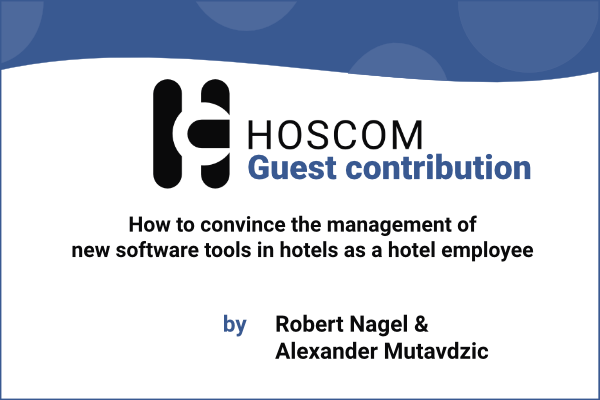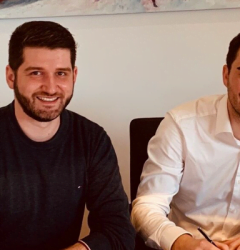03 May

How to convince the hotel management of new software tools as employee
In our career as director of finance and director of revenue, we spent a lot of time looking at different digital systems and softwares. Some made more sense, some made less sense and most of the time we only knew it after we had tried them out for a while to find out how efficient or economical they really were.
Only a few specialised software tools in the hotel industry have a free trial version and for most of them there is not enough time to find out if there is a real cost-benefit.
Besides too short test versions, we as department managers failed to implement new digital tools because of a lack of budget or because we did not know how to ensure steady support for the new software.
Typical questions about new software that we stumbled across at the time were.
- How many employees can work effectively with the tool?
- How can the added value be calculated using fixed KPIs?
- How long does the daily system maintenance and setup take?
- What are the setup costs for the company?
To make a decision for the right software and implement it in your hotel, we believe there are two different possibilities:
a) You present the tool in an endless loop within the jour fixe to your manager(s). Most of the time they argue that there is a lack of budget and you move the tool to the end of the to-do list of the jour fixe until it finally disappears from the list.
b) With a little preparation, you create a business case and ask the all-important YES / NO question at the end.
At first, such a business case sounds like a lot of work, anglicisms and complicated Excel tables. This is exactly when you mix up a business case with a business plan. This business case is much shorter and more concise than a detailed business plan.
Here are our five most important tips that should be considered in a business case, without claiming to be exhaustive.
#1 - What are the contract details of the software to be purchased?
As a first basis, you should know exactly how long your company will commit to a new contract partner. There may be setup costs or a long contract period. You should find this out as soon as possible. The advantage is that with a tool that does not have a long contract period, there is little that can go wrong. Many companies have reduced setup costs to make implementation as easy as possible. Therefore, make sure to include this point in your PowerPoint slides!
#2 - What is the added value and how does the tool help me in my everyday life?
An essential point, because most of the time CEOs hire departmental professionals (like you) to be the specialist in your field. Rarely does a CEO know your daily concerns, challenges in the efficiency of systems or in communicating with staff and only sees the positive or negative results, if any. Be as specific as possible and point out challenges with current systems as specifically as possible. Here, less is definitely more (it has to stay realistic)!
#3 - Is an improvement in KPIs evident through the tool?
In the best case, short-, medium- or long-term results can be measured by soft or hard factors that you can look at over time and thus easily justify the implementation and cost of the software. To do this, you should also give the software or system provider an idea of your scope. Think about whether these points apply to you and use them as a basis for your argument.
#4 - Can a cost-benefit calculation be made?
One of the most difficult points when you have defined the possible improvement KPIs is to make a cost-benefit calculation. You might have to spend a good part of your working time with the potential new tool. So in the best case you reduce your working time and achieve a better result than before implementing the tool. If you have very easily tangible points here, creating a chart might make sense. If not, then a pro-contra list, where the points for the software should clearly outweigh the others?
#5 - Sell like hell!
Ultimately, the presentation of the business case is about expressing a clear opinion (“I could imagine that …” vs. “I think we get enormous added value from …”). If you have prepared very well for the presentation of the business case, you will be convinced of your presentation and also stand behind what you need.
Finally, if you are convinced of an idea that will bring added value to your hotel, we advise you to prepare a structured and well-prepared business case. Even if it is well structured, the process usually involves a lot of discussion and haggling. In return, you may be able to significantly improve your day-to-day work and delight many employees with an
improvement in their daily lives. Be brave and share your feedback or challenges with us. We look forward to hearing from you.
About the authors

Alexander Mutavdzic - Director of Finance Mandarin Oriental Munich
Alexander Mutavdzic has been director of finance at the Mandarin Oriental Munich since 01.12.2022. Due to his versatile experience in various 4-5 star hotels, he is very familiar with the current finance topics and challenges in the German hotel industry.

Robert Nagel - CEO Revard Digital
Robert Nagel founded his company Revard Digital in 2022 to help hotels digitise and automate work processes. Previously, he was director of consulting at berner+becker revenue management and opened Roomers Munich, Autograph Collection, as director of revenue together with Alexander.


